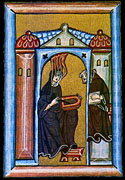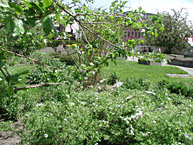On campus
Back to learning!
Although we here at the Reporter are decades away from retiring, the McGill Institute for Learning in Retirement (MILR) makes us wish we could get some fake ID. Not for the seniors discounts -- the MILR is gearing up for "Wonderful Wednesdays" a series of courses where the emphasis is on peer learning.
 Hildegard of Bingen
Hildegard of Bingen |
|
What this means is that all summer long, you can learn from fellow MILR members on topics as diverse and eclectic as you can find anywhere: the first day of seminars include forensic science, portraits of famous russians, a talk on the war on terror and its international repercussions, sessions on theatre and music and a discussion of antiques. Later in the year, students can learn about the witches of Salem, Hildegard of Bingen and ask the question: "The Exodus: Fact or Fiction?"
Members are encouraged to do research and to use the McGill libraries. There are no educational prerequisites, no age limitations, no exams and no grades.
The program starts July second and runs every Wednesday for 9 weeks. There are two daily sessions from 10 am to noon, and 1 pm to 3 pm.
Registration is open to members and guests. Classes are $5. Contact MILR at 398-8234, email milr.conted@mcgill.ca, or look on the web at www.mcgill.ca/conted/courses/milr/.
Making scents of herbs and flowers
Gardening is one of the gentler pleasures in life. Seemingly the domain of the more mature among us, it's really just an adult version of the playing in the dirt we did as kids. Gardens, both tending and sitting in, are balms for the overworked soul.
 Photo: Claudio Calligaris
Photo: Claudio Calligaris |
|
If you find yourself with a bit of time on your hands over the summer, wander up to the Roslyn Robertson Herb and Scent Garden (named for the widow of McGill principal from 1962-1970, H. Rocke Robertson), maintained by the McGill Women Associates Garden Club. For now, the small patch of respite is a petal's toss from the McIntyre Medical Sciences Building, towards the Peel street entrance. Kathy Grauer, president of the McGill Women Associates, says that they are considering a new location in case this one disappears with the planned construction of the Bellini Life Sciences Building.
The garden is where I saw the first crocus of the season, back in March (weeks before they could be found anywhere else). Not 10 feet away was that other harbinger of spring -- a beady-eyed red-breasted robin.
The green and growing things have a whiff of magic about them, or am I just anticipating the rue? All sorts of herbs can be found there -- just check the handy dandy key posted on the side. From it I learn that rue, other than being an old magic herb, can be used sparingly in soups and stews, and relieves nervous headache.
Some of the herbs are poisonous, some perk up food, others are used for dye or cosmetics. Calendula, or pot marigold, has the market cornered on utility: its petals can be used to flavour omelets and cheese and as a substitute for saffron in rice; it assuages cuts, abrasions and sunburn; cosmetically it's good for the complexion.
There are foxglove and columbine, tansy and mint. Read about clove pink, "once used to flavour ales and wines, especially at coronations -- hence the name 'carnation,'" and wonder at golden feverfew, which used to be believed to purify air and ward off diseases such as "gaol fever" a.k.a. typhus. Its leaves are still used to repel insects -- just rub them on your skin.
Sweet fennel is nearby to rupturewort. Tea made from the first has calming and anti-flatulent properties, while the second relieves kidney and bladder problems. Catnip's not just for your tabby to roll around in -- an infusion of the kitty narcotic is good for helping people with insomnia.
Need inspiration for the pot? Check out their six kinds of basil, from anise basil to dark opal basil, admire their tarragon and chickweed, contemplate their chervil and lovage. For olfactory pleasures, sniff the budding lilacs and imagine the roses to come. And only when you've had your fill of summery pleasures and restored your inner equilibrium, go back to work and dream of the cool earth.
For information on the garden, call Susan Burpee, 933-1852.
Nature editor hotspot lecture
It was the year Joseph Stalin died, the Korean War ended and Patti Page had a huge hit with "Doggy in the Window." It was 1953 -- the year Nature published an article by two Cambridge scientists who wrote "We wish to suggest a structure for the salt of deoxyribonucleic acid (DNA). This structure has novel features which are of considerable biological interest."
Considerable indeed. That paper ushered in a new age of biological research that continues to this day. The current editor of Nature will be coming to McGill to discuss "Hotspots in science and science communication." The talk is sponsored by McGill and the British High Commission as part of their celebration of the fiftieth anniversary of Watson and Crick's discovery.
Though Campbell is a physicist by training, he is an oft-quoted and published commentator on scientific issues, as well as a former adviser to the UK Government's Office of Science and Technology on the public consultation on the regulation of biosciences and biotechnology.
In his view, both science and the media are changing, but neither scientists nor the public are necessarily comfortable with the outcomes. His talk will highlight key pressure points and possible ways of dealing with them.
Philip Campbell, "Hotspots in science and science communication," Wednesday, June 4, room 112 Otto Maas Chemistry Building 12:00 pm. RSVP (613) 237-1542 ex. 2629 or Tammie.Millar-Wallace@fco.gov.uk.
Summer conference calls
 Dr. Evil ponders McGill's conferences
Dr. Evil ponders McGill's conferencesPhoto courtesy New Line Cinemas |
|
Classes are out, exams are over and the weather is warming up. Professors everywhere are gearing up to head for the beach... but in these days of global warming and thinning ozone, wouldn't it make more sense to head for the air-conditioned, fluorescent-lit halls of the conference circuit? You don't even need to pay for a plane ticket: McGill is hosting conferences all summer long.
Who could resist an Evil Workshop? McGill University and the Carnegie Council on Ethics and International Affairs are hosting a conference on "Evil and International Affairs," June 2-6. Political Science professor Catherine Lu is one of the facilitators of the event, which hopes to stimulate fruitful interaction between those in the humanities and social sciences on a compelling and pressing theme in world politics. For more information, you can visit the CCEIA website at www.cceia.org, or contact Catherine Lu at 398-4817 or catherine.lu@staff.mcgill.ca.
From June 16-19 the Delta Hotel will host "Mother and Infant: Perinatal Influences on Health." The conference seeks to better understand the consequences of perinatal disturbances on infant health. Check out www.motherinfant.ca for more info.
Music professors Julie Cumming and Peter Schubert are coordinating a conference on Renaissance composer Josquin Desprez entitled "Josquin and his Models: The Emergence of Pervasive Imitation." Call 398-4547 for more information.
Physicists will be bumping into each other and discussing "Topics in Heavy Ion Collisions" from June 25-28. The conference is sponsored by McGill, Laval and the National Superconducting Cyclotron Laboratory, Michigan State University. Contact Elizabeth Shearon at 398-8434.
A veritable carnival of brain and drug research is the subject of the 26th Annual Meeting of the Canadian College of Neuropsycho-pharmacology. The conference is from June 1-4. Contact Dr. Lalit Srivastava at lalit.srivastava@mcgill.ca.

